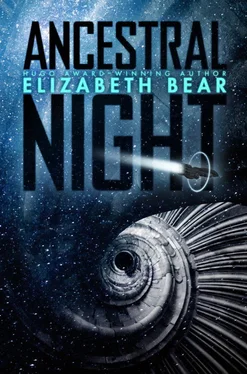So our species are, in the parlance of the Synarche, elder systers to one another.
Cheeirilaq and I both waved back.
Does Habren know?
Cheeirilaq’s wing coverts buzzed. That seemed more like a shrug than a yes, given what I also picked up through the senso.
Who. Who did this to me?
They are Jothari. The Synarche’s greatest tragedy. But I think it was Terran pirates who murdered their crew and stole their ship and… cargo. Such a wave of distaste that I could feel it through the senso, despite our incompatible neurologies.
The name meant nothing to me.
What do you mean, the Synarche’s greatest tragedy? We don’t have tragedies anymore.
Well, Cheeirilaq said, perhaps we still did, a long time ago.
And it proceeded to tell me the history of how the Synarche learned to be a patient suitor, because it turns out that making mistakes is how we grow up, whether we’re a multispecies alien utopia, or just some dude screwing up their first romance beyond believability.
This is what I learned: early on, when the Synarche was new, it was not a Synarche yet at all, but a Galactic Parliamentary Democracy—and grandiosely so named, because in those diar it consisted of five or six of the foundation systers and perhaps a dozen systems. The short version of a very long and ugly story is that by the time the Galactic Parliamentary Democracy encountered the Jothari, the Jothari were working on establishing a smaller but still thriving interstellar community of their own. They’d come of age in one of the sparser and darker arms of the Milky Way—not unlike my own species, as it happened, so I feel a certain sympathy for this—and had never seen any evidence of sentient life until a Parliamentary ship dropped out of white space over their homeworld, ascertained that they were a spacefaring species, and opened communications in as friendly a manner as possible, considering a language gap.
I mean, when you show up in orbit over somebody else’s inhabited planet, not dropping a rock on it or tossing your bow wave in their direction is, in itself, a reasonable assurance of goodwill, but not everybody understands that—and there is, I suppose, the possibility that you might want a quickly habitable planet afterward.
Anyway, the Jothari had managed to reach a couple-three of their closest neighbor systems, and had pretty good shipping and space-colonization efforts going on. Then the Galactic Parliamentary Democracy ship full of weirdos like my friend the Goodlaw showed up and opened communications. The Parliamentary crew was not met in a friendly fashion, but at least no shots were fired.
They drew back, and that was when they found out that the Jothari were navigating by harvesting Ativahikas, a species generally-accepted-as-sentient, who had a migratory path running through the core of Jothari space. The Synarche’s antecedents tried to intervene, leading to the beginnings of a war.
Through absolute blind bad luck, an antibiotic-resistant pandemic broke out among the Jothari worlds around then, and somewhere between 60 and 80 percent of their population died. They declared this an act of war on the part of the proto-Synarche, and came gunning.
There was a lot more of the proto-Synarche, and despite the Jothari superior navigation, the Synarche… wiped them out.
Not to the last being. But to the last world, leaving those that remained homeless. And not welcome in proto-Synarche space—if they would have considered coming near the government that had committed semi-involuntary genocide against them. So they made their way as best they could.
Maybe they have shadow colonies, Cheeirilaq said. Maybe they’ve gone as far out as Andromeda and possibly even made allies there. Though if they had, I’m not sure we’d still find them scavenging around the edges of Synarche space.
They’re not in the databases.
No. Well, you could find them. They’re not expunged. Just deemphasized. And it’s possible the archinformists used keywords that were less than helpful to the neophyte to archive and classify the data.
Possible. Sure. And Habren doesn’t want me to know about them?
[Habren’s species] was one of the ones involved in the initial mistake. It gave me its version of Habren’s species name, which was as made-up as the human version, the original being in plant pheromones. They’re culturally very ashamed. That was about the time people started looking for a better system of government, it turns out. My people have a saying, that every civilization is founded in a terrible crime.
There didn’t seem to be much I could say to that. Even given my limited knowledge of the vast span of Terran history, terrible crimes seemed terribly commonplace, and didn’t usually lead to enlightenment.
The swirling, sinking sensation in my gut was grief, and I let myself feel it, along with the gratitude for what the Synarche was. Imperfect, surely; infested with its own brands of sophipathology and problematic social constructs. Walking a fine and wavering balance between the conformity and regulation necessary for social cohesiveness and the observance of individual freedoms within reason.
But also comprised of such a plurality of individuals and syster species spread across such vast distances that it was difficult to obtain an even vaguely accurate census, and somehow, through the tuned social consciences of all of us, managing to function.
There was pride to be taken in that.
It never could have happened without rightminding. And rightminding, taken to extremes, gave you clades. But clades also made a lot of people happy who would have been lonely and broken and without community otherwise.
Nothing is perfect. Except the Well. And what could be more perfect than the great big gravity chute of Supermassive Black Hole Saga-star, churning along in its spot at the center of the Milky Way? That’s pretty near as perfect as a thing can conceivably be: a horizon of perfect destruction.
Why do you do this? Cheeirilaq asked me, breaking a contemplative silence I hadn’t noticed until it ended. The mantid was one of those creatures you could just hang around with, not saying anything, and not notice the quiet because it felt natural. I would have liked it for a shipmate, though Singer would have been a little small. You could go sit planetside and do pretty much anything at all forever, without competition for scarce resources. So why come out here and risk your neck at all?
Huh. Apparently humans and twelve-legged, six-winged mantids have some of the same expressions of speech. Who would have guessed?
I was born out here. Why do you? I countered.
Crowded homeworld. I remembered from somewhere, possibly crèche, that Cheeirilaq’s people are solitary except for mating and child-rearing. The latter of which is carried on in nursery crèches in which all adults are expected to take a turn. Other than that, they have hobbies and entertainments and pretty much keep to themselves, being intensely territorial.
“One Rashaqin, one station,” as they say. Not because they’re so tough. Because they just really don’t get along.
Strange that it seemed perfectly able to get along with unrelated sentients. Maybe that was pheromones.
It said, Had to go somewhere. I like solving crimes.
That doesn’t tell me how you wound up out here in this nest of Freeport sympathizers.
It whetted its killing manipulators one over the other, which looked like a threat but might have been a shrug. Got into some administrative trouble in the Core.
Noncommittally.
I wondered if it had eaten a suspect. If it had, I hoped the suspect deserved it. It seemed like a good cop, as such things went, and I’d hate to think less of it.
Читать дальше












